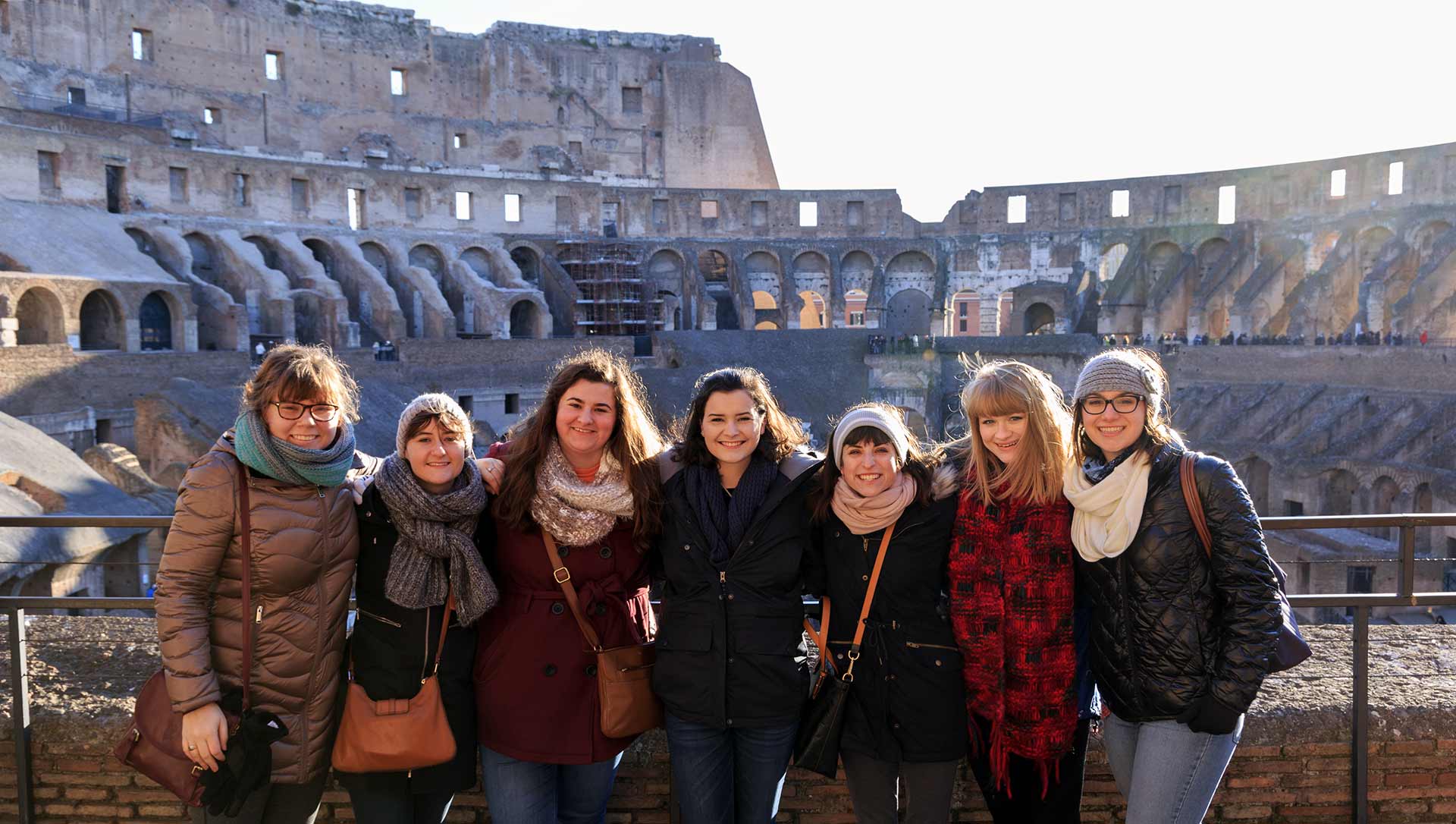Classics and Philosophy

About Classics
Majors in classics, Greek and Latin provide students with the opportunity to pursue a course of study that covers a variety of Greek and Latin prose and poetry in the original languages, as well as the history and culture of the classical world and its importance for the 21st century. While the Greek major and the Latin major allow students to concentrate their undergraduate program around the mastery of a single language, the classics major encourages training in both Greek and Latin.
Each of these majors would be an appropriate program of study to prepare a student for graduate study in classics or ancient history, but they are also designed for students pursuing a broad program of study as a background for graduate programs in the humanities and professional programs in fields such as medicine, dentistry, theology, and law. Likewise, a minor in classics, Greek, or Latin can strengthen the majors and degrees throughout the College of Arts and Sciences and the university by supporting and complementing the many disciplines that draw on the classics.
Students who major or minor in Greek, Latin or the classics at Samford University will discover a new world offering the wisdom of ages past. With a key that unlocks the universe of the ancient Greeks and Romans, students will open a door leading to adventures in history, literature, philosophy, archaeology, theater, poetry-the breadth of human experience as lived by Homer, Socrates, Plato, and Paul as well as by Cicero, Julius Caesar, Augustus and Augustine.

Enhance your classroom learning through visceral, personal encounters with Italy and Greece. Learn why Henry Miller said, "The light of Greece opened my eyes, penetrated my pores, expanded my whole being.” Experience what Augustus meant when he proclaimed he "found Rome a city of bricks and left it a city of marble." Dig into these study abroad options:
Greece: The Crucible of Civilization
Classics 303 (4 credits)
An adventure in Greece finds you following the footsteps of Plato and of Paul as you explore the ancient ruins, the rugged mountains, the timeless sculptures, the peaceful beaches, the historic battles, the savory cuisine, the haunting poetry that is Hellas, which is Greek for Greece.
This class guides students through winding streets to the foot of the Acropolis, then through its gateway to the base of the Parthenon. This is the heart of Athens, birthplace of democracy, and just one of many incredible classrooms in which you will experience with all your senses the epic of Homer, the tragedy of Sophocles, the wisdom of Socrates and the journeys of Paul.
Italy: Eternal Rome
Classics 304 (4 credits)
In Rome, ancient edifices lie around every corner, so as you wander the medieval streets past Renaissance palaces on your way to savor the joy of gelato, you'll wonder at the ubiquitous fragments of our classical inheritance. Rome will deliver unexpected surprises to those who heed Horace's call of CARPE DIEM.
This class leads students out of the classroom and into world famous archeological sites (think Colosseum) and world class museums (think the Vatican Museums and its Sistine Chapel) in order to examine the history and culture of Rome from its Greek and Etruscan antecedents through the Roman Republic doomed by Julius Caesar on to the Roman Empire established by Caesar Augustus, all the way to the Renaissance transformation of the Classical ideal.
Exploring the civilizations centered at Rome and Athens will rigorously educate you as you dissect patterns of language, study the structure of an epic poem, or analyze the material remains of a Roman fortress. Your friends and family will wonder at your academic courage, while graduate schools and employers will know and respect that you have willingly faced an intellectual challenge.

"The Department of Classics and Philosophy are all incredibly invested in our growth and have been personally involved in my academic decision-making and extracurricular interests. They have provided opportunities to meet and speak with visiting professors and foster an environment for us to meet and connect with other students in the department."—Abigail Kizziah, Classics major
About Philosophy
The degrees offered in Samford's philosophy program equip students to think in an informed and reflective way about the perennially important issues of life—morality, the nature of truth and reality, how we know the world, beauty and art, faith and reason, evil and suffering, justice and society. Students learn to formulate opinions on these issues by engaging the best representatives in the history of philosophy, and develop the skills of inquiry, analysis, communication, and decision-making that will distinguish them in any profession. Our majors earn prestigious fellowships, attend top graduate programs and answer callings in disciplines ranging from business and ministry to education and health care.
In the philosophy program we focus on these questions and how they have been answered over the 2,500 year history of philosophical discussions. Our students learn to read, discuss, and critique the great ideas and arguments that have shaped our Western intellectual culture. Because our professors encourage active, rich discussion of issues vitally important to society in general and to the university in particular, our community plays an indispensable role in Samford's fulfillment of its mission as a Christian university.
Academic Programs
Undergraduate Majors
Classics
Samford’s Classics Major offers an outstanding education in Greek and Latin prose and poetry in the original languages, as well as the history and culture of the classical world and its importance for the 21st century. Our academic emphasis and travel opportunities provide outstanding preparation for careers in ministry, medicine, education, religion, government and law.Learn More
Greek
The Greek Major emphasizes the prose and poetry of ancient Greece, travel opportunities and courses in the history and culture of the classical world as outstanding preparation for graduate study and careers in ministry, education, history, archaeology, religion, political science, law and philosophy.Learn More
Latin
The Latin Major’s emphasis on prose and poetry, travel opportunities and courses in the history and culture of the classical world creates a foundation for graduate study and careers in medicine, ministry, education, history, archaeology, religion, political science, philosophy and law.Learn More
Philosophy
Samford’s Philosophy major equips students to think in an informed and reflective way about the perennially important issues of life—morality, the nature of truth and reality, how we know the world, beauty and art, faith and reason, evil and suffering, justice and society. Students learn to formulate opinions on these issues by engaging the best representatives in the history of philosophy. They also develop the skills of inquiry, analysis, communication, and decision-making that will distinguish them in any profession.Learn More
Philosophy and Religion
Students in the Philosophy and Religion major engage with rich and informative philosophical reflections on religion, and develop understanding of the various and important aspects of religious belief, including the relationship between reason and faith, life after death, and arguments for God’s existence. It’s an outstanding course of study for students preparing for graduate education and careers in education and ministry.Learn More
Undergraduate Minors
Classics
The Classics Minor is an excellent choice for students called to law, ministry, government, religion, archaeology, education and any other career that values historical perspective and traditions, language skills, philosophical sophistication and international experience.
Learn More
Greek
A Greek Minor serves many callings, and is especially valuable as preparation for graduate study and careers in ministry, religion, classics, archaeology, philosophy and education.
Learn More
Latin
Our Latin Minor pairs well with majors related to classics, medicine, ministry, education, history, archaeology, political science, philosophy and law.
Learn More
Medical Ethics
The Medical Ethics minor promotes the study of the ethical foundations of medicine and health care through a multidisciplinary study of philosophy, theology, literature and ethics. It’s an outstanding complement to any health care degree and a solid foundation for ethical medical practice.Learn More
Philosophy
A minor in philosophy helps students think in an informed and reflective way about the perennially important issues of life—morality, the nature of truth and reality, how we know the world, beauty and art, faith and reason, evil and suffering, justice and society. The minor complements all disciplines, and is especially valuable for business majors because it helps them develop core skills of entrepreneurship, including debate, comfort with the uncomfortable, seeing the big picture in the smallest details, keeping emotions in check, dissecting complex problems and distinguishing the truth.Learn More
Science and Religion
The Science and Religion minor equips students to address issues arising at the intersection of science and religion. It’s an ideal complement to majors in biology, computer science, health care, religion, journalism and sociology.Learn More
Classics & Philosophy Scholarships
Mabry Lunceford Scholarship
The Mabry Lunceford Scholarship, honoring a former Samford religion and philosophy professor, is awarded on the basis of merit and need.
Mae E. Flynt Travel Scholarship
The Mae E. Flynt Travel Scholarship is awarded to help students participate in Classics Department programs in Greece and Italy.
Cookie Preferences | Privacy Policy | Software Plugins
Microsoft Excel®
Microsoft Power Point®
Microsoft Word®
Adobe Portable Document Format
